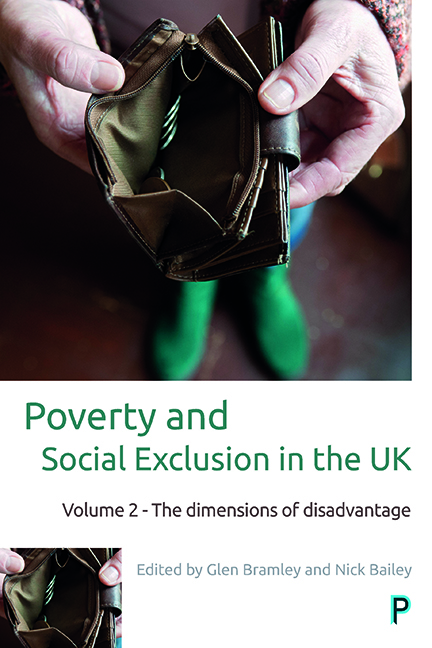Introduction
Published online by Cambridge University Press: 12 April 2022
Summary
In 2012, nearly three out of every ten people in Britain fell below the minimum living standard set by society as a whole, twice as many as did so in 1983. One-in-ten households lived in a damp home, a thirty-year high. The number of those who could not afford to heat their home adequately had trebled since the 1990s, rising from three to nine percent. The number of those who had skimped on meals from time to time over the previous year had doubled since 1983 – up from thirteen to twenty eight percent. (Lansley and Mack, 2015: p ix)
The Poverty and Social Exclusion UK (PSE-UK) Survey is the largest and most comprehensive survey of its kind ever carried out in the UK. Funded by the Economic and Social Research Council (ESRC), the 2012 exercise was the latest in a succession of surveys which have been assessing poverty in the UK since the late 1960s. One key contribution of the study is to update the measure of relative poverty based on the number of people suffering different forms of deprivation. As it is based on a consensual or democratic approach, this measure carries a unique political legitimacy and moral imperative: we can show that a majority of the British public views these conditions as unacceptable. The PSE-UK approach provides a very direct, easily understood picture of what it means to be poor today: inadequate housing, a lack of heating, and insufficient food, as the quote above shows. And it can be used to assess change over time. As Lansley and Mack's overview of the evidence shows, poverty has actually risen at the same time as the country has become considerably richer.
The PSE-UK approach has been hugely influential nationally and internationally. These deprivation scales are used in the UK's official measures of child poverty and in the EU's poverty reduction target for 2020, for example. However, they are much less widely reported or discussed than other poverty measures, notably those based on low income. The PSE-UK survey therefore assesses poverty on wide range of measures. Comparing results across these alternatives enables us to contribute important evidence to debates about the validity of different measures as well as improving our knowledge of how the choice of measure shapes our understanding of the extent and incidence of poverty.
- Type
- Chapter
- Information
- Poverty and Social Exclusion in the UK Vol 2The dimensions of disadvantage, pp. 1 - 24Publisher: Bristol University PressPrint publication year: 2017



